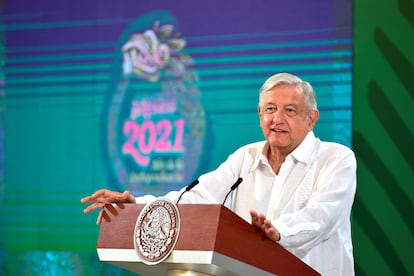President Andrés Manuel López Obrador, in Veracruz on July 26. MEXICO'S PRESIDENCY / Reuters
When I see Andrés Manuel López Obrador become a full-time spokesperson for himself, the famous phrase of Groucho Marx comes to mind: "It took me so long to write the review that I didn't have the opportunity to read the book."
When listening to the mornings or reading about the tours in which he spends long periods of time selling the benefits of his Government and of his person, sometimes I wonder if the dedication of so many hours to the promotion is not taking time from the task of governing better .
Even those of us who sympathize with the flags raised by Andrés Manuel López Obrador would have to wonder if he has been a good president. Personally I prefer it to the previous ones, but that is not saying much and in any case I am convinced that it could have been better. Of course, an honest answer would require, from the outset, defining the parameters of what a good president would be. There is no doubt that López Obrador has been an extraordinary candidate, he has been all his life. And perhaps part of the problem is that it did not cease to be so throughout the six-year term. The consultation that will come about the revocation of the mandate, next March, will keep him exultant because it will give him the justification to do what he likes to do the most: run for office.
For the rest, the consultation on the revocation of the mandate is a safe bet for the president. First, because over three years it has maintained approval levels around 60% and that will not change in the next eight months. Second, because we can take for granted that many citizens, even without agreeing with their government, maintain relative respect for the presidential institution and will prefer that the term for which they were elected ends without further setbacks. Let's not forget that the consultation will take place two and a half years from the end; many will assume that there is no point in attempting a change at this stage. And then there are the catastrophists,those who assure that the deposition of López Obrador would mean a worse scenario because Morena would be in control of power and his reaction could lead to the election of a radical character to complete the term. Something that, I insist, is out of any probability, but to the extent that some believe it López Obrador it will be easier to sweep the consultation in question.
The possibility of revoking the presidential mandate in the middle of the six-year term is not an entirely bad idea. Six years is long if we compare it with other countries in which the term of office consists of five or four years, even though in the majority there is the possibility of re-election for one or more additional terms. In parliamentary political systems, even the possibility of removing a president who has lost popular support has been in force from the first moment of his government.
Thus, in principle, the possibility of offering citizens a mechanism to remove from power an ostensibly deplorable ruler, in the opinion of the majorities, is not a bad thing. But landing the idea is more complicated. Originally it had been considered that the middle of the six-year term was the most propitious time to organize a consultation of this nature, but the fact that it coincides with the midterm elections would distort the meaning of this evaluation when simultaneously crossing ballots to elect governors, mayors, deputies local and federal. That is the reason why this time it was decided to postpone it for almost a year.
We will continue dragging that problem six-year term after six-year term. The calendar does not offer comfortable alternatives: doing it for just two years would make it a useless exercise, since it is still very little time for the majority of the electorate to drastically modify the decision taken two years earlier when electing the acting president. Even if there are many people disenchanted with government management, it is likely that they prefer to extend the benefit of the doubt a few more months. And, on the other hand, transferring such a consultation to the fourth year of government incurs the risk, already mentioned, that many of the nonconformists assume that it causes more damage or instability to seek an alternative than to let the current six-year term end.
On this first occasion, we can take for granted that the request for revocation of the mandate will have null legal consequences for practical purposes.
But in symbolic terms, the obradorismo will turn it into a political landmark of the greatest importance.
López Obrador will have to win with a wide margin and the victory will be converted into a kind of commendable and definitive historical judgment on his Government by the people and regardless of what his critics say.
Perhaps the main drawback of this consultation, now and in the future, is that it establishes practically two presidential campaigns per six-year term in Mexico;
the first among several contenders, the second exclusively about the sovereign.
Something that, of course, comes from pearls to the president who in a certain way has never wanted to stop being a candidate.
@jorgezepedap
Subscribe here
to the
newsletter
of EL PAÍS México and receive all the informative keys of the current situation of this country

